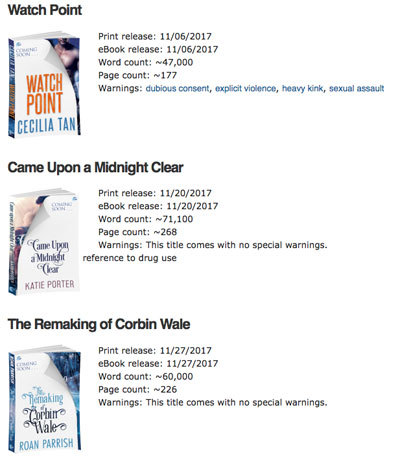Cecilia Tan's Blog, page 9
November 5, 2017
Launching today! WATCH POINT! Hot gay Navy SEAL romance from Cecilia Tan
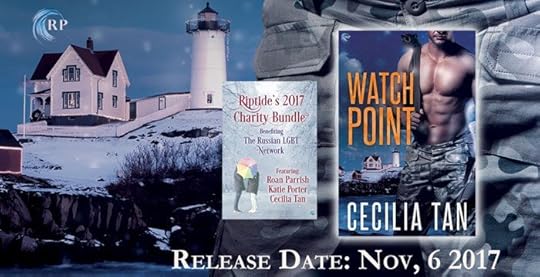
It’s launch day! Boom! Watch Point, the gay Navy SEAL abduction romance you’ve been hearing me talk about for the past year is finally out in the wild! The book can be bought singly or as part of Riptide Publishing’s 2017 Charity Bundle to benefit the Russian LGBT Network.
Find Watch Point other sites: Amazon | iBooks | Barnes & Noble | Goodreads
The charity bundle also contains Roan Parrish’s The Remaking of Corbin Wale, and Katie Porter’s Came Upon a Midnight Clear. 20% of all proceeds, whether you buy the bundle or the individual books, goes to the Russian LGBT Network.
WATCH POINT is probably not your “typical” Christmas romance. There is cuddling by the wood stove and there is a Christmas party at a mansion with carolers. But as is usual in my books, the focus is on the erotic attraction between the characters. I don’t know of many “Christmas romances” that carry warnings for dubious consent and heavy kink…! Our scenario involves an ex-Navy SEAL kidnapping his billionaire former boss’s son for revenge and taking him to an isolated island in Maine… More plot details below.
20% of all proceeds will be donated to the Russian LGBT Network.
The Russian LGBT network was founded in April 2006. It is an interregional, non-governmental human rights organization that promotes equal rights and respect for human dignity, regardless of sexual orientation and gender identity. They unite and develop regional initiatives, advocacy groups (at both national and international levels), and provide social and legal services.
To learn more about the charity or to donate directly, please visit their website: https://lgbtnet.org/en.
Official Description
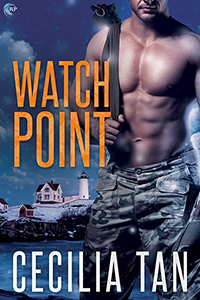 Eric Sakai-Johnson joined the Navy SEALs to protect his country and the people he loves. After discharge, he finds himself relegated to protecting big pharma billionaire Aiden Milford from assassination attempts and kidnapping. Until Aiden reneges on a promise, fires Eric, and lets Eric’s mother die with millions of dollars in medical debt.
Eric Sakai-Johnson joined the Navy SEALs to protect his country and the people he loves. After discharge, he finds himself relegated to protecting big pharma billionaire Aiden Milford from assassination attempts and kidnapping. Until Aiden reneges on a promise, fires Eric, and lets Eric’s mother die with millions of dollars in medical debt.
Now Eric is the kidnapper. Snatching Aiden’s twenty-two-year-old son, Chase, for a multi-million-dollar ransom is the only way to get justice. It’s time for Aiden to learn what it’s like when someone you love is at the mercy of forces beyond your control. Eric has it all planned out. The one thing he didn’t plan for is the intense erotic spark between him and Chase.
Chase has been chafing under his father’s autocratic control. A gay hookup app has been his only ticket to rebellion—to clandestine moments of freedom, excitement, and danger. Now it’s his ticket to a deep connection and amazing sex with his “captor.” On the rocky island where they’re sequestered, Chase finds Eric to be everything he wants in a man: quiet, strong, capable, and honorable . . . until he finds out he’s been captured for real.
First in the Wayward Warrior series by Cecilia Tan.
October 5, 2017
WATCH POINT: new gay Navy SEAL romance from Cecilia Tan and Riptide Publishing
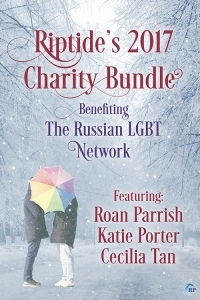 Just got the news that WATCH POINT is up for pre-order! This gay Navy SEAL abduction romance can be bought singly or as part of Riptide Publishing’s 2017 Charity Bundle to benefit the Russian LGBT Network.
Just got the news that WATCH POINT is up for pre-order! This gay Navy SEAL abduction romance can be bought singly or as part of Riptide Publishing’s 2017 Charity Bundle to benefit the Russian LGBT Network.
The bundle also contains Roan Parrish’s The Remaking of Corbin Wale, and Katie Porter’s Came Upon a Midnight Clear. 20% of all proceeds, whether you buy the bundle or the individual books, goes to the charity.
WATCH POINT is by far the most trope-tastic thing I’ve ever done, a Christmas-themed, Navy SEAL, billionaire, abduction romance. It all fits together perfectly, though. Oh, and did I mention erotic? Of course it’s erotic–it’s me who wrote it, after all. It’s one of the few “Christmas romances” I’ve seen that carries warnings for dubious consent and heavy kink. (Description at the bottom of the post.)
20% of all proceeds will be donated to the Russian LGBT Network.
Each year, Riptide Publishing releases a holiday collection in support of an LGBTQ charity. Twenty percent of the proceeds from this year’s collection will be donated to the Russian LGBT Network.
The Russian LGBT network was founded in April 2006. It is an interregional, non-governmental human rights organization that promotes equal rights and respect for human dignity, regardless of sexual orientation and gender identity. They unite and develop regional initiatives, advocacy groups (at both national and international levels), and provide social and legal services.
To learn more about the charity or to donate directly, please visit their website: https://lgbtnet.org/en.
Cover reveal coming soon! Plus a small blog tour at the beginning of November. The official launch date for WATCH POINT is November 6.
Eric Sakai-Johnson joined the Navy SEALs to protect his country and the people he loves. After discharge, he finds himself relegated to protecting big pharma billionaire Aiden Milford from assassination attempts and kidnapping. Until Aiden reneges on a promise, fires Eric, and lets Eric’s mother die with millions of dollars in medical debt.
Now Eric is the kidnapper. Snatching Aiden’s twenty-two-year-old son, Chase, for a multi-million-dollar ransom is the only way to get justice. It’s time for Aiden to learn what it’s like when someone you love is at the mercy of forces beyond your control. Eric has it all planned out. The one thing he didn’t plan for is the intense erotic spark between him and Chase.
Chase has been chafing under his father’s autocratic control. A gay hookup app has been his only ticket to rebellion—to clandestine moments of freedom, excitement, and danger. Now it’s his ticket to a deep connection and amazing sex with his “captor.” On the rocky island where they’re sequestered, Chase finds Eric to be everything he wants in a man: quiet, strong, capable, and honorable . . . until he finds out he’s been captured for real.
First in the Wayward Warrior series by Cecilia Tan.
September 18, 2017
Circlet Press 25th Anniversary Celebration (at Cecilia’s house)

It’s hard to believe that 25 years have gone by since I founded Circlet Press by hand-stapling 100 copies of Telepaths Don’t Need Safewords on the floor of my Fenway studio apartment (the apartment was too small for a table). This week I’ll be opening my doors (at my much larger home in Cambridge) as part of our 25th anniversary celebration!
Two things are happening on Saturday September 23rd!
1. Massive book sale! 12 noon to 4pm
2. Party! Happy anniversary Circlet! 8pm to midnight
The massive book sale is just what it sounds like. We’ll be selling not only lots of Circlet books, some at bargain prices, some rare out of print for reasonable prices, we’ll also have tons of other books that we’ve accumulated in our 25 years as a publisher, including lots of science fiction, fantasy, romance, erotica, and YA. I get a lot of books in goody bags at conventions, publicists mail them here hoping for comment or review, and tons come every year when I serve on award juries, so there is a lot to choose from! Come on down and bring a shopping bag!
The party, on the other hand, is for all supporters, patrons, donors, and friends of the press! If you’re not a donor to the Kickstarter or the Patreon, go on and chip in now!
Kickstarter: http://kck.st/2xL0iEm
Patreon: https://www.patreon.com/circletpress
If you’re coming to the party, RSVP below so we’ll know how much food to get!
Loading…
August 3, 2017
Schedule for #Outwrite2017 keynote speaker Cecilia Tan
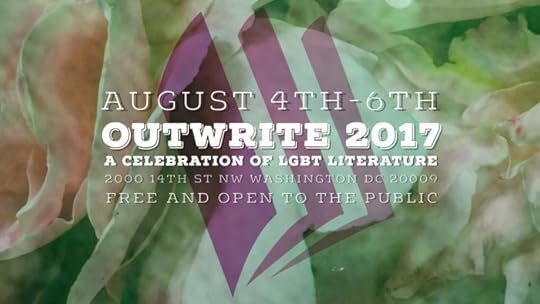
This weekend is the Outwrite queer lit fest in Washington, DC, and I’m honored to be this year’s keynote. Instead of doing a dull speech about how ancient and wise I am (hah) I’m doing a pile of events and panels:
FRIDAY NIGHT I’ll be one of the lineup of storytellers at Smut Slam Cabaret, where I’ll tell a brief adventure of how being an erotica writer almost sent me to the emergency room. Don’t try this at home, kids. No wait, home is exactly where you should try these things…
SATURDAY DAYTIME at the DC Center:
Free and open to the public!
I’ll be exhibiting and selling books from 10am to 1pm and then sporadically between my many shindigs:
1:00 PM THIS IS HOW WE DO IT
Panel on queer publishing. With me will be Lisa Moore (Redbone Press), Steve Berman (Lethe Press), Lori Perkins (Riverdale Ave Books), and moderated by S. Andrea Allen (BLF Press).
3:00 PM CIRCLET PRESS 25th ANNIVERSARY HISTORY AND BINGO GAME
I’ll tell you a tale of how the past 25 years of publishing adventure has gone, and to keep it interesting we’ll make it a bingo game! That way you can win books. Come have fun with me.
5:00 PM EROTICA READING
I’ll be reading with three other authors, Christian Baines, Dena Hankins, and Michael M. Jones.
6:00 PM KEYNOTE PANEL: THE POLITICAL AND THE EROTIC
With me will be some of the writers and editors on the front lines of the intersection of sex writing and politics, Sunny Moraine, Michael M. Jones, and Lori Perkins.
All events except the Smut Slam are at The DC Center For the LGBTQ Community, 2000 14th Street NW, Suite 105, Washington, DC 20009.
If you’re on Facebook you can see the complete lineup of events here: https://www.facebook.com/pg/outwritedc/events/
If you’re avoiding Facebook for political reasons, unfortunately I can’t find the full schedule of events anywhere, and given that many LGBTQ folks have very good reasons to avoid Facebook it’s a bit disappointing that the event’s main website doesn’t seem to have a schedule up (but maybe I’m just not looking in the right place): http://thedccenter.org/outwrite/
July 28, 2017
The #RWA17 Workshop on Creating Ensemble Casts

I’m at the RWA national conference in Orlando right now, where there’s always something more to think about, learn, or analyze about writing or romance publishing. In particular one writing craft panel I wanted to highlight was yesterday I attended a great panel workshop given by four New York Times bestselling authors: Lexi Blake, Cynthia Eden, Laura Kaye, and Rebecca Zanetti. The topic was on creating a large cast of characters to carry a series and the room was packed.
The discussion ranged over various details from the nuts and bolts of creating a series “bible” to keep all the details right from book to book (character eye color, favorite catch phrases, back stories, each character’s hidden secret or flaw, etc) to developing secondary characters into primary ones when “their turn for a book” comes.
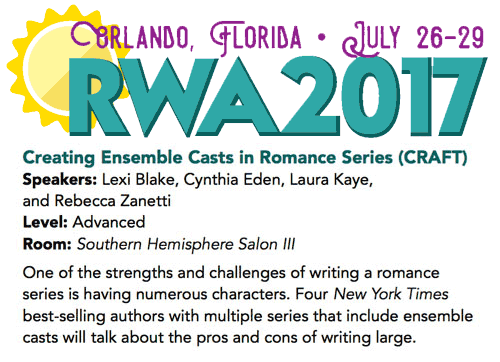
I didn’t transcribe the entire panel since I was trying to focus on absorbing things relevant to me, but two questions in particular I got down almost every word, and I’m posting to share it with everyone.
Laura Kaye acted as moderator, asking the leading questions for the panel and then finishing off giving her own answer.
First she asked the panelists to describe the pros and cons of working with large casts.
Cynthia Eden: We’ve all heard the expression that no man or woman is an island? Characters don’t exist in isolation. You’re never just writing about one individual. You are by circumstance always writing about a cast of characters. You give them an instant background with their family and friends. With my romantic suspense novels I like to use teams. I write FBI teams. You’re going to need a lead investigator, a profiler, an ME, etc. You’re going to need all these people. So that’s a major pro. And any cast leads to sequels. That’s the biggest pro because it has your reader eager to go on to the next book.
Lexi Blake: Pro of a large cast? It’s fun! I like to write a lot of dialogue and you get a lot of dialogue when you have a big ol’ cast of characters. The con is… I guess there isn’t one. Well, maybe it’s that you have to make each character unique. That can be a challenge. (But that’s fun, too.)
Rebecca Zanetti: A large cast is great to show characterization. You act differently with different people. I have one sister I tease like crazy and one that I can’t. You can show different facets of a character and that’s one I like a lot. Also the slow burn character, I love. That person who shows up in book one and they build up for a long time before they get their story. You can develop them over a series. The con is you sometimes get too many people on a page. Even if you’re on book 4 or 5 of a series, you hope new readers are picking them up. You don’t want to confuse that new reader with too many new characters all at once.
Lexi: Well, and as you write the books they get longer because you keep having to put everyone’s favorite characters in there. Then you have to do the backyard BBQ scene to get them all in!
Laura Kaye: I agree, on the backyard BBQ. The thing that is great about having all these characters is you have the built in relationships where it’s easy to have humor, and it’s easy to have stakes because there are many people who could be hurt or feel lied-to or betrayed. Lots of emotional hooks for your readers. Not just for your sequels where they buy into a beloved secondary character, but for the tertiary characters who can manage to hook interest and get pulled into the story. You can expand a series if it takes off and starts doing well. It gives you the flexibility to do spin-offs. The cons are that your POV characters can’t just absorb a tennis match of other people talking. They have to be engaged in the conversation. Then there’s the giant pronoun problem when you have, say, five military guys on your team planning a mission and you have to figure out the mechanics of writing that dialogue so it’s not monotonous to the reader. The other con is if you’re going with a traditional publisher and you have 5 main characters, but your publisher stops after three books. You can end up with disappointed readers on your hands.
What are some tips for developing such a large number of characters? What are some tips for distinguishing them?
Rebecca: One thing I like is nicknames, if he calls her honey or sweetcheeks makes a difference. Also their motivations. If you play a joke on one friend, they laugh, another one never forgives you. They’re different. There are the little tidbits you put in. I have one guy that likes grape energy drinks and if I don’t put that in readers will write and say does he not like those anymore? Also their wounds. What hurt this guy, what is he still afraid of?
Lexi: if you don’t know those characters, the reader won’t know them. I think you don’t have to know everything before you start, but you have to know what makes them laugh, what makes them cry. I’ve written a lot of small town romance. And getting to know the neighbors and walking through the town can pull you in. But even an office building can have a sense of place. Put your characters around a table and see who talks first. If you’re just putting traits in a notebook and there’s no real emotion behind them it’s going to show. I love using dialogue. Some speak, fast, some slow, and you need to be able to hear them in your head.
Cynthia: I like to work with opposites on a team. You’ll have one guy who’s the hothead and always jumps right in. Then I have a team member who likes to sit back and get all the info before jumping in. So she and the first guy are going to have a clash. My action-first character, if he’s angry, he’s not just going to sit still. He’ll be pacing and clenching his fists and all that. All this body language that this character is doing with reveal his personality. The one who is the analytical sort? She’s not going to just kick in a door. She’ll be trying to talk the person down. Those personality styles lead me into what they should do in each scene. You don’t want them doing something that isn’t their normal nature without a really, really good explanation. Be aware, though, I’ve had New York editors tell me that the way I talk isn’t real, people don’t say that. I’m Southern. Something that seems so normal to me was something they didn’t like. But I think bringing in realistic dialect is a great way to distinguish the characters.
Laura: Think of it as a shorthand for your character. I learned a lot about creating unique characters from reading JR Ward’s Black Dagger Brotherhood series. One is the blind king who wears the weird sunglasses. And one is the sarcastic one with the dragon tattoo who sucks on lollipops all the time. Then there’s the black-eyed, scarred one who is soulless and never speaks. I don’t even have to use their names: they’re immediately distinct. And when all twelve are in a room having a briefing session, you don’t have to use their names, because you know when so quickly from their distinguishing characteristics who’s who. Also, what are things that make the reader see them as endearing or real, that make the reader fall in love with that person? That grape energy drink or they’re a dog-lover or whatever. The more you can create those personal things the better, beyond scars and tattoos, beyond eye color and hair color. I have a lot of guys who swear but they can’t all say “Aw, hell.” Only one of them can say that and the other guys have to say something else.
As usual, the conference has been fantastic. If you are writing romance, or any kind of commercial fiction, I highly recommend attending one of these if you can afford it. In romance, I really feel I can’t afford *NOT* to be here!

June 26, 2017
Coming Out as a Slytherin
Ars Technica published an article by me on Pride Day (yesterday, traditionally the last Sunday in June) entitled “Coming Out as a Slytherin.”
In the article I detail how there have been a series of “closets” whose doors I have had to kick down, from coming out as bisexual in the 1980s, to coming out as a pro who also wrote fanfic in the 2000s, to, eventually, realizing I had to come out as Slytherin, too.
In the article I talk about the pervasiveness of the anti-Slytherin bias in the books, which carries right through from Harry’s first hearing of the word through the epilogue:
“One of the magics of the Potter books for me was that as I read them, I was transported back to feeling like a kid again. … My journey as a fan… started from a childlike devouring of the books where I took Harry’s journey at face value. Harry hated Snape and Draco? I hated Snape and Draco. Harry thought all Slytherins are bad? I thought all Slytherins are bad. It’s a book for kids, right? A simplistic worldview is appropriate and comforting.”
“But the moment I leapt into fandom headlong was also when book six, Half-Blood Prince, came out. In that book, Harry keeps on thinking that Snape and Draco are villains. It’s also a book where many adult readers started realizing that Snape and Draco are victims. I went back and re-read the entire series through Snape and Draco’s eyes and what I saw was very different.”
“I guess you could say it was the Potter fandom equivalent of being woke. The anti-Slytherin bias throughout the series was so strong, and yet I had never noticed it before. It was so pervasive. Harry takes the word of various characters throughout the books as “truth” so long as the person saying it was considered one of the “good guys.” Take Hagrid for example. When he tells Harry in the very first book “There’s not a witch or wizard who went bad who wasn’t in Slytherin,” Harry believes him and so do we.”
“Hagrid probably believes it, too. But it’s not even true within the books. We meet plenty of non-Slytherins who “went bad,” including Peter Pettigrew (Gryffindor) and Gilderoy Lockhart (Ravenclaw).”
“And in the epilogue, 19 years later, although Harry himself seems to have finally decided that Snape was a hero and all Slytherins aren’t bad, the rest of the Wizarding World has clearly fallen right back into the old bias. His son’s angst about being Sorted basically boils down to “Daddy, what if I’m in Slytherin?”
“Try replacing that with “Daddy, what if I’m queer?” Harry has the good-parent response: we’ll still love you. But society won’t.”
The barriers we erect in our minds, and between people in society, are imaginary. But as Dumbledore tells Harry in the “King’s Cross”/limbo scene, just because something is all in your head doesn’t make it not real.
In the article I also talk about how in my college campus activist days bisexuals were seen as “only half gay” and for that reason I felt only “half welcome” in the queer community at first. Part of my journey as an activist was learning that I couldn’t let that bias keep me from participating and that the main gatekeeper I had to get past wasn’t in “the community” but in my own head.
So this article is for all my Slytherin peeps out there, whether your road to self-acceptance was hard or easy! It’s because of you I was able to see how that bias had shaped my worldview and to take pride in the qualities in myself that make me a Slytherin at heart.


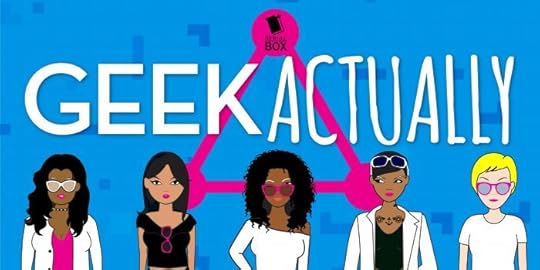
June 1, 2017
Where to find Cecilia Tan at #TheBookCon – Diversity Panel & Autographing
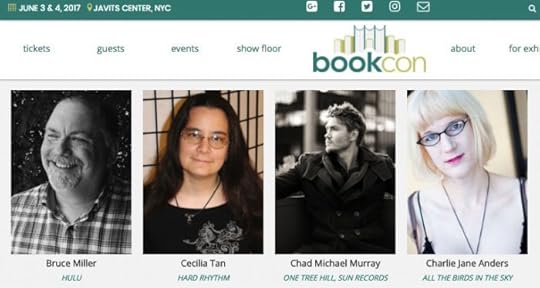
The annual book industry gathering known as BookExpo America is going on right now and then over the weekend it turns into booknerd paradise, an open-to-the-public extravaganza called The Book Con. See the full star-studded lineup of guests here: http://www.thebookcon.com/guests/2017-Guests/
(Holly Black! Bill Nye! Christina Lauren! Gabby Rivera! Heather Graham! Janet Mock! Majorie Liu! etc etc etc!)
I’ll be there doing the following: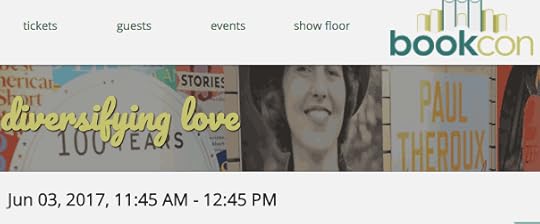
Diversifying Love: Panel Discussion
June 3, 11:45am to 12:45 am
Downtown Stage
Panel discussion moderated by Sarah MacLean (bestselling author and Washington Post columnist), joined by authors Nicole Blades, KM Jackson, Seth King, Tracey Livesay, Cecilia Tan, and Mara White and reader/USA Today Happy Ever After contributor Denny Bryce.
The official description: Multicultural romance is not new…but the majority of players in the proliferating and ever-popular Romance genre agree that stories of love need to feature “people of all colors, religions, abilities and sexual orientation” (thank you, #weneeddiversebooks, for trailblazing). As stories of race and prejudice blare and glare from national headlines, authors and readers of this popular genre agree about one powerful, life-changing/life-affirming message: Love Transcends. Romance has the power to open readers’ minds to stories that could imbue new understanding and acceptance in the ways we relate to one another. BookCon is pleased to host a frank discussion about the need for inclusive, representative Romance.
I *think* there will be giveaway copies of various of our books at the end of the panel? The description also says: “Discover all there is to love about a popular genre whose authors and readers are embracing a wide spectrum of experience, and we invite you to take away a book that will open your eyes to the multiverse of romantic possibility.” I’m just not sure which titles or how many of each will be on hand!
I KNOW there will be plenty of copies of HARD RHYTHM, my latest rock star romance, on hand at my other shindig, though, free autographing at the RWA Booth:
AUTOGRAPHING FREE BOOKS
To see the complete schedule of who is signing in the RWA Booth on Saturday and Sunday, it’s posted here: https://www.rwa.org/page/rwaatbea.
The list includes Megan Frampton, Damon Suede, Joanne Rock, and many more writing in many genres from historical to YA to erotic contemporary. The signing at the RWA booth is FREE. Just line up and I’ll sign until either my time slot ends or we run out of books, whichever comes first! (Not all the autograph events at BookCon are free. Some you pay for the book. Not this one, though!)
I’ll be signing my latest one from Forever/Grand Central Publishing, HARD RHYTHM. It’s third in the Secrets of a Rock Star series, which can be read in any order. Each book involves a different member of the rock band known as The Rough. We’ve already had the lead singer (Taking the Lead) and the guitar player (Wild Licks), so now it’s drummer Chino Garcia’s turn.
“Geek Actually” from @SerialBoxPub – “Sex in the City” for nerdgrrrls

I’m so excited that a project I’ve been working on for almost a year is having its debut next week!
Geek Actually is a fiction serial I’ve co-written with Cathy Yardley, Melissa Blue, and Rachel Stuhler for Serial Box Publishing. The official tagline is:
Sex and the City for the modern geek girl. Follows the lives of five diverse, geeky women as they navigate work, love, life, and the internet.
It’ll be in text and in audio formats! The first episode (titled WTF) premieres June 7, 2017, with a new installment every Wednesday until the season finale on August 30. Episodes can be purchased individually at any time for $1.99, but Season Passes at Serial Box allow readers to pay for an entire serial upfront at a discount – $19.99 includes all 13 episodes in both text and audio (about $1.53 per episode).
You can read it via the Serial Box app on iOS or Android or subscribe through their website here. Or the individual episodes can be pre-ordered/purchased from:
Serial Box • Amazon • Barnes & Noble • Apple iTunes • and other usual places ebooks and audiobooks are sold!
Excerpts:
Before publication there’s a sneak peek of vignettes of the main characters here: http://bit.ly/get-GEEK-early
Smart Bitches Trashy Books published a preview excerpt: http://smartbitchestrashybooks.com/2017/04/geek-actually-cover-debut-excerpt/
May 5, 2017
Live at #RT17 – Mark Coker @Smashwords Ten Trends Shaping Authorship
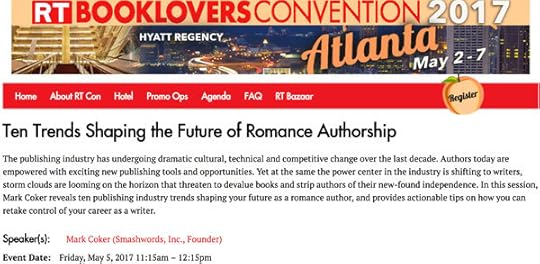
I’m at RT Booklovers this week, which is one of the largest reader/writer conferences out there. RT started life as “Romantic Times” but it now encompasses all commercial fiction genres including YA, mystery, women’s fiction, science fiction, and so on, but retains a strong romance focus. One of the major forces that has reshaped the book industry, and the romance genre in particular, of course, is ebook publishing and ebook SELF-publishing. A major figure in that revolution over the past ten years has been Mark Coker of Smashwords, one of the early self-publishing platforms and not only an online retail store but a distributor to the other retailers (Kobo, Apple, B&N, etc.)
Mark always has insightful things to say about the state of the ebook market, and later today he’ll be unveiling the annual Smashwords data survey, where they slice and dice the big data of what’s happening in sales across all retailers that they can see. But his earlier session today was “Ten Trends Shaping the Future of Romance Authorship.” With Mark’s permission I’ll now present you those ten trends as a listicle.
(Caveat: This is very close to verbatim what Mark said, but as a typist I can only capture about 60% to 70% of the true transcript, and any errors you may find in here are purely mine.)
Mark Coker: So much news happening every day, every month, it can be bewildering, and it’s easy to mistake ephemeral news for trends. Today I’m going to talk about firmly entrenched macro trends that are going to persist for a long time. These are what are driving your threats and opportunities in publishing forward. Some may be obvious, some may not. These may provoke some strong feelings. These are some important issues that should provoke greater discussion so please share this information widely:
1. Rise of Ebooks
Screens are the new paper. Until about 2012-2013 we saw exponential growth in ebook sales. Overall now ebooks are 25% of the retail book market (in terms of units). In romance ebooks and self-publishing are a much larger portion than in other genres, and if we look at the amount of time spent reading or pages read on screens (rather than unit sales), 50% of all pages are now read on screens. But growth has slowed and we’ve reached a print/ebook equilibrium now. Ebooks are going to continue to be a top choice for many readers. Instant delivery of reading pleasure is what continues to drive ebooks, along with low prices and huge diversity of choices, and convenient sample and purchase selections.
All authors are indie authors because you have the freedom to choose whether you indie publish, trad publish, or hybrid.
2. Democratization of the publishing process.
The gatekeepers used to control the entire industry. Publishers were the gatekeepers at the pearly gates of authordom. But because of digital, publishing is now democratized. You also couldn’t have a million books in a store, meaning distribution was artificially constrained by the footprint of the store. But shelfspace online is free/cheap and unlimited. Even if your book doesn’t sell a single copy, every retailer wants to keep your book “in stock.” It’s the reader judgement that matters more than others. Readers are the gatekeepers now. The best practices knowledge has also become democratized. You’re learning how to become a more professional author and publisher. Authors are starting to wonder what they need a publisher for and this is pushing publishers to be better partners to authors.
40% of all sales via the Apple store are in other countries.
3. Ebooks are going global.
Free from the logistical limitations of print, it’s now possible for readers around the world to have access to millions of books. Kobo was the first to go global. Apple was in 51 different countries. Amazon is now in 14 to 200 countries depending how you count. Smashwords is in every country we can reach. 90% of what is at Smashwords is English, but 40% of all sales via the Apple store are in other countries. As these retailers build out their global footprints, ebooks on sale in them will grow, too.
Being pro-author doesn’t mean being anti-publisher.
 4. The rise of indie authorship.
4. The rise of indie authorship.
Self-publishing has been around for a long time. Dan Poynter published his self-pub manual for decades (before he passed away a year and a half ago) but it’s really the ebook revolution that changed indie authorship and made it the most viable. Being pro-author doesn’t mean being anti-publisher. I wrote an indie author manifesto about how every writer deserves to be a published author. Every writer deserves to have a chance to be judged by readers. The manifesto talks about the professionalism that indie authors have. Don’t let anyone tell you you are an amateur if you have the knowledge and capabilities to do it. All authors are indie authors because you have the freedom to choose whether you indie publish, trad publish, or hybrid. Some in the indie community have tried to turn it into a religious war against the publishers. That’s toxic. There are plenty of reasons publishers can be criticized, but all options make for a more vibrant publishing ecosystem. In the early days of Smashwords we had some early authors in 2008 and 2009 who hit the NY Times list and then were recruited away by the publishers. At first I was sad about losing them but then I realized it’s really a reason to celebrate. How many here are already self-publishing? (*most hands raised*) How many here are considering self-publishing (who haven’t before)? (*a few more hands raised*) A few. Self-publishers love that they have total creative control. They have faster time to market. They keep all their rights. You can go global without having licenses divvied up all among various markets as if it’s a print world. You have access to the same professional grade tools that the big publishers do. You have lower expenses than a big publisher. You can offer your customer a lower-priced product than the big publisher and earn a higher royalty. You earn from 60 to 80 percent of the list price as a royalty per sale. A trad published author earns 17% to 20% in royalty (25% on the NET, not on the list price).
5. Indie authors are hitting all the bestseller lists.
It used to be only every once in a while that a self-published book would hit the lists. Now it’s commonplace, almost every week. I know the NY Times has screwed up their lists a little bit for romance, but this trend isn’t going away. I truly feel indie ebooks are going to dominate the ebook bestseller lists in the future. The larger macro trend here is that indie ebook authors will continue to use their strategic advantages over big publishers. You spend 24 hours a day thikning about your readers. Your publisher can’t do that.
6. The stigma on self-publishing is melting away.
In the olden days self-publishing was “vanity publishing.” Ten years ago the thinking was that only publishers could decide which books were good enough to publish. The idea was you took your rejection and you worked harder on another book and another book until you wrote one good enough to get published. That was hogwash. It was toxic. The authors who published themselves with Smashwords in 2008 are my heroes for breaking free of that mindset, for daring to publish themselves. Some of those romance authors achieved commercial success with books their publishers had given back to them as “worthless.” Those romance authors were the first ones who showed us you could self-publish with pride, professionalism, and commercial success. That’s what is causing the stigma to melt away. Jamie Maguire was one of the indie authors who hit the Times list with Beautiful Disaster, then worked with a publisher. She really appreciated what they did for her, but then she decided to go back to self-publishing. She felt she could serve herself and her readers better with self-publishing. It’s great to have this freedom to choose. Others feel very disillusioned by the publishers. 25% on the net is too low. Publishers need to raise their ebook royalties. They’re still too slow to market. Kristin Ashley was another one couldn’t even find an agent, much less a publisher, but she was judged by readers [to be a commercial success]. Work with publishers and your agent to make sure you have a reasonable reversion clause so you can have your books back in the future when the publisher is no longer actively supporting your book. Again, they can’t love your book as much as you do.
7. The glut.
We’ve reached a point where there are nearly unlimited numbers of good quality low priced ebooks. Everyone and their cat can–and has–become an author. No really, we have cats who are authors at Smashwords. (*laughter*) The supply of product is growing faster than the supply of customers. The trad publishers are starting to come down in price as a result. (Author’s note: but some Big 5 publishers still have $12.99 and $9.99 prices on their romance ebooks, which is nuts IMHO.)
The other ebook retailers are slowly being bled dry.
8. Amazon is driving massive devaluation of ebooks because of this glut.
Take what I say with a grain of salt: I’ll try to be nice about it but I’m about to rip into Amazon. A lot of people don’t understand the brilliance of the Amazon business model: lowest possible prices and largest possible selection. It’s great as a customer to have that and their great service. But they also have KDP Select, their opt-in self-publishing option where you give them exclusivity for 90 days in exchange for better placement in the Kindle store. We don’t know how many books are in KU at any given time but it’s over a million books and is probably more than three million books. That’s a million reasons for customers to abandon other retailers and only purchase at Amazon. The other ebook retailers are slowly being bled dry. Amazon doesn’t have to make a profit on ebooks. They can keep squeezing the suppliers to keep offering their customers lower and lower prices. If you, the author, are the publisher, you can’t outsource your writing to a cheaper labor market like China. You still need to put food on your table. If the dominant ebook retailer–Amazon has 70% of the market–forces you to take less money, they are bullying you. They are bullying you into making your book more discoverable and more attractive to Amazon’s customers for the tradeoff of choking off the supply to other retailers, and forcing you to take a lower price than $2.99 or even 99 cents. Here you’ve finally achieved independence from the publishers and then bam, now you’re giving your independence back to Amazon.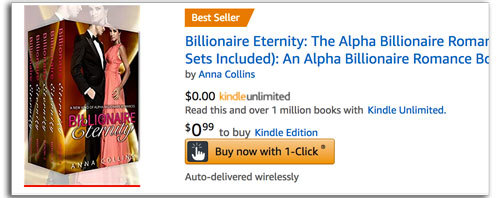
9. Kindle Unlimited
KDP Select/Kindle Unlimited is undermining the single copy sales of ebooks. One single copy sales you’re earning 60-80 percent of the list price. Not in KU. They are training the largest community of readers out there to read for what FEELS LIKE FREE. Even 99 cent books start to look expensive when you could read for free. At Amazon on the retail page the largest thing you see says “Read this book for free” with Kindle Unlimited. Now your amazing romance readers, who read more than a book a day, can just pay that $9.99 a month to Amazon and never pay for another book again. Even if you read five books a day you never run out of books at KU. I’ve already heard from Smashwords authors who have heard from readers “I won’t read your books unless you make your books available in Kindle Unlimited.” Millions of readers are being trained to think your $2.99 ebook is too expensive, and then the other level of devaluation is you are also being paid less. Amazon pays you out of the monthly pool with page reads. Yes, they make that pool bigger and bigger but they offer you less and less and put more restrictions on what you can do with your books. Amazon HAS to do that because their business model IS to offer the lowest possible prices for the largest selection. It makes it impossible for the other retailers to compete. As a reader, how many reading hours to you get per dollar spent? With KU you get more. The slippery slope has started and the only way for other retailers to compete is going to be to do the same thing and keep paying you less.
So you may be asking, are we all screwed?
10. Indie authors are writing the next chapter for this industry.
YOU decide when, where, and how you publish. And it’s the collective decisions of everyone in this room over the next 24 months that determine the course of this industry for the nexy generation. That will determine if the sell-per-copy ebook retailers are going to survive. If there are only one or two sellers of a product, they will control your destiny. First let’s talk about the good news: indie authors are continuing to capture larger and larger parts of the reader market and you have access to those readers that you didn’t have ten years ago. Let’s celebrate that the power center moved from publishers to authors. But the bad news is that authors are surrendering their independence to KDP Select/Kindle Unlimited. Every book that goes in there is a vote to kill off the other retailers and a vote to surrender your independence. It’s hurting Amazon’s pure play retail competitors. Kobo and Barnes & Noble are very committed to you. But because their businesses are under stress, they can’t invest as much in you as they might want. So you may be asking, are we all screwed? And I mean that in a bad way! (*laughter*) Are we all going to become zombies leaving a sticky trail of unfinished adult coloring books in our wake? (*laughter*)
It’s partly up to us what happens. We lamented how Walmart moved in and put our local businesses out of business. We lamented how our manufacturing jobs moved to China. But it was to feed our gluttony. Amazon just feeds our gluttony. They do it to the big distributors and they do it to us. Squeezing their suppliers is the only way their business model can work. You as an author are relegated to the status of commodity producer. Commodities are indistinguishable from each other. You write a unique book, but reading is subjected to commodification. Reading is pleasure and experiences, and if there are so many great books out there, they will find another writer to go to. When Amazon launched KDP Select in 2011, I wrote a blog post that day saying it would lead authors to being tenant farmers tilling Amazon’s soil. You want your own soil and not to lose your independence. We fed the pet tiger that we knew would grow up to be a predator. We need to tame the beast. We need to say no to exclusivity. Authors and publishers must diversify sales channels. Amazon can suddenly crush you in the night when they roll over and change their algorithm. They can bury you so no one can find you. Publishers need to be more author-centric. Publishers are a service-provider to the author. They need to abandon the idea that only certain books are worthy. They are losing the pipeline of new authors. I’d like to see publishers adopt the best practices of self-publishing platforms so they don’t die off. Yeah, it would be great for my business if all publishers went out of business because it would drive authors to Smashwords, but I want a healthy ecosystem where we can all thrive.
Think long term. I have authors who tell me they hate KDP Select but they tell me they have to provide for their family and they need the bird in the hand instead of two in the bush. As an author, though, you have to say no to anyone who wants to take away your independence. Be paid for your own work, decide your own prices, don’t be limited where you sell. The more retailers in the world the better. Even if you never work with a trad publisher, the fact that they are out there is good for you. You may need them later.
Author asked a question question: I have eight books out there right now that were selling well on Amazon, but they changed the algorithm on February 28 and buried me. Sales dropped to 10-12 percent of what they were. So I put one book into KU on May 1st hoping it would help my name pop up again because I was desperate.
Mark: I understand that. But you’re poisoning the well. You cut off your other retailers and hurt them. Kobo and Barnes & Noble need your help because they don’t have another business. Apple will be fine because they have more money than god. So do Google even if they don’t know what they’re doing. But for the retailers who depend on ebooks it really hurts them.
Eventually what’s going to happen is only authors who PAY to be read on Amazon will be read on Amazon. Authors have been subsidizing the trad publishing industry for decades. Most writers in trad publishing couldn’t live without also having a day job. So publishers depended on not paying them enough to actually live. This is even worse than that.
Amazon makes it tricky. They make it seem like you have to be in KDP Select. Every step of the way there are check boxes and things that tell you “don’t you want to make the most money? click here.” Some authors don’t even know it’s optional. (And some customers don’t realize they can pay for the book instead of joining KU, too. -ctan)
Promote all retailers on your websites, not just Amazon. Have links to all the others.
Author question: But the reason we link to Amazon from our websites is because Amazon gives us a kickback with affiliate links. Does Smashwords do that?
Mark: Smashwords offers a commission but we are a small store. Our store pays the highest percentages, up to 80% list, so that’s the way we do it, you set your own price, your own percentages. I know Kobo and Barnes & Noble supposedly have affiliate programs also.
Author: They do but they’re much more complicated. You have to set up a Rakuten Linkshare account and it’s nowhere near as easy as Amazon makes it.
Mark: They need to make it easier for authors if they’re going to continue to compete. That’s an easy thing they could do.
Author question: What alternative are there in print to using Amazon’s Createspace?
Mark: Ingram Spark is the best POD alternative to Createspace. Ingram is the biggest book distributor in the world and they’re great people. They’re the old publishing world but with Spark they are moving into the indie world.
(That was all we had time for. I’ll be back to see the results of the annual Smashwords data analysis later today!)
May 4, 2017
The #RT17 BDSM panel wrapup and handouts
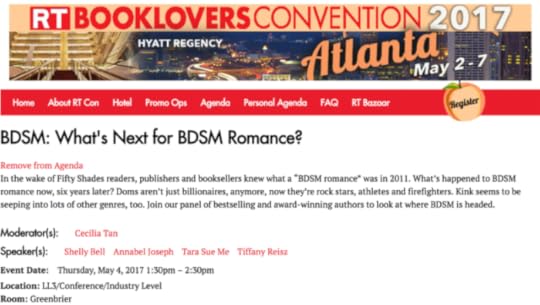
Thanks everyone who attended the panel at RT Booklovers in Atlanta on BDSM: What’s Next for BDSM Romance?
If you need the handout, you can grab the PDF from here: RT BDSM HANDOUT. It includes some specific sales numbers from the authors on the panel demonstrating the rise and fall of sales numbers.
I opened the panel by saying when we first started planning the panel it seemed like if we were all seeing sales drops like that, it was legitimate to ask whether the post-50-Shades “BDSM boom” was over. However, since compiling our numbers, I’ve been talking to many authors in other subgenres of romance and erotica, and to publishers as well, all of whom have seen very similar curves in rise/fall even when no BDSM is involved. So, it’s not just us.
Shelly Bell brought up that Amazon is constantly changing which keywords they have decided to suppress, and you have to be very careful not to use words like “forced” in either keywords or descriptions.
Among the factors that the panelists spoke about, which have led to each of our individual numbers dropping:
-Kindle Unlimited has cornered the market on power readers of erotica
-Amazon suppresses the search results of many erotic books
-A glutted market with many many authors leaping into publishing BDSM
Overall the demand for BDSM erotica and romance might even still be rising, but with so many books being published, each slice of the pie gets slimmer. Now that we are 6 years after 50 Shades broke huge in the book market, everyone also knows about BDSM, though. This means that kinky scenes are slipping into other genres of romance. Tiffany Reisz mentioned her latest Harlequin Blaze novel has a scene where the hero makes the heroine crawl across the floor. Six years ago that might have been seen as too much for an otherwise vanilla sex scene, but “my editor didn’t even blink!”
Annabel Joseph has taken the BDSM into historical romance with many of her self-pub titles. I would love to see more of that and I recommended a new book as a resource, Peter Tupper’s OUR LIVES, OUR HISTORY: Consensual Master/slave relationships from Ancient Times to the 21st Century.
One of the lighter moments on the panel, I asked them to describe what kink or thing in their books they’d included that they had to explain to their editors. Tara Sue Me: “Figging.” Annabel has also used figging —
which is the insertion of a ginger root where a ginger root usually doesn’t go — and she has readers telling her often about how they think of her book in the produce section of the grocery store. Tiffany Reisz: “Snowballing.” Google it. She had to take it out of the scene. (My own editor made me take out mention of the hero’s foreskin.)
All four agreed if you’re going to get into writing BDSM scenes in your romances, do your research. Get on FetLife (which is like Facebook for kinky people) where you can join discussion groups and talk to people. Go to munches (real life meetups for groups of kinky and kink-curious people in public places). The community is full of exhibitionists who love to talk about their sex lives. :-)
Much much more wisdom was dispensed by these fine writers, but you had to be there to soak it all in!
Follow the panelists on social media and sign up for their newsletters:
Cecilia Tan:
Twitter: @ceciliatan
Instagram: ctan_writer
Mailing list/newsletter: http://bit.ly/ctannews
Tara Sue Me:
Twitter: @tarasueme
Mailing list/newsletter: http://tarasueme.com/contact/
Shelly Bell:
Facebook: ShellyBellBooks
Twitter: @ShellyBell987
Mailing list/newsletter: http://www.shellybellbooks.com/join-mailing-list.html
Tiffany Reisz:
Twitter: @tiffanyreisz
Read free stories at http://www.tiffanyreisz.com/free-stories/
Annabel Joseph:
Twitter: @annabeljoseph
Facebook: AnnabelJosephNovels
Mailing list/newsletter: http://eepurl.com/E0pyb



